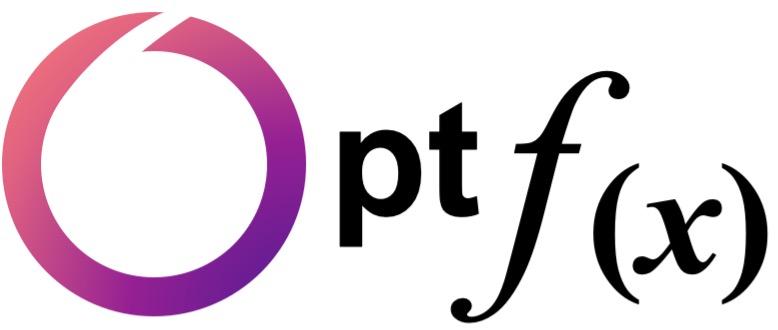Note (updated May 2024): This repository is not currently maintained. An updated version is continued to pytop.
optfx is a library for the large scale field optimization platform based on FEniCS ecosystem. This module enables reusable and straightforward UFL coding for inverse problem of multi-physics.
This software is the third-party module of fenics project.
This software is based on Lagacy FEniCS (FEniCS2019.1.0). The new version, FEniCSx, is not supported.
This README and documentation is now under construction.
import numpy as np
import optfx as opt
opt.parameters["form_compiler"]["optimize"] = True
opt.parameters["form_compiler"]["cpp_optimize"] = True
opt.parameters['form_compiler']['quadrature_degree'] = 5
comm = opt.MPI.comm_world
m = 0.30 # Target rate of the material amount
p = 5 # Penalty parameter
eps = 1e-3 # Material lower bound
R = 0.01 # Helmholtz filter radius
n = 256 # Resolution
def k(a):
return eps + (1 - eps) * a ** p
mesh = opt.UnitSquareMesh(comm, n, n)
X = opt.FunctionSpace(mesh, 'CG', 1)
f = opt.interpolate(opt.Constant(1e-2), X)
class Initial_density(opt.UserExpression):
def eval(self, value, x):
value[0] = m
class Left(opt.SubDomain):
def inside(self, x, on_boundary):
gamma = 1/250 + 1e-5
return x[0] == 0.0 and 0.5 - gamma < x[1] < 0.5 + gamma and on_boundary
U = opt.FunctionSpace(mesh, 'CG', 1)
t = opt.TrialFunction(U)
dt = opt.TestFunction(U)
bc = opt.DirichletBC(U, opt.Constant(0.0), Left())
class PoissonProblem(opt.Module):
def problem(self, controls):
rho = controls[0]
rho = opt.helmholtzFilter(rho, X, R)
a = opt.inner(opt.grad(t), k(rho)*opt.grad(dt))*opt.dx
L = opt.inner(f, dt)*opt.dx
Th = opt.Function(U, name='Temperture')
opt.solve(a==L, Th, bc)
J = opt.assemble(opt.inner(opt.grad(Th), k(rho)*opt.grad(Th))*opt.dx)
rho_bulk = opt.project(opt.Constant(1.0), X)
rho_0 = opt.assemble(rho_bulk*opt.dx)
rho_total = opt.assemble(controls[0]*opt.dx)
rel = rho_total/rho_0
self.volumeFraction = rel
return J
def constraint_volume(self):
return self.volumeFraction - m
x0 = opt.Function(X)
x0.interpolate(Initial_density())
N = opt.Function(X).vector().size()
min_bounds = np.zeros(N)
max_bounds = np.ones(N)
setting = {'set_lower_bounds': min_bounds,
'set_upper_bounds': max_bounds,
'set_maxeval': 1000
}
params = {'verbosity': 1}
problem = PoissonProblem()
solution = opt.optimize(problem, [x0], {'constraint_volume': [0]}, setting, params)We recomennd to use our docker image. First you should install docker.io or relavant systems. Our docker image was stored in the dockerhub.
If you use the docker.io and docker-compose, the following command pull and run the above image.
docker-compose upFirst, make sure to install the following dependencies:
Second, install using pip.
pip install git+https://github.com/Naruki-Ichihara/fenics_optimize.git@main
API: API Documentation: Docs
To cite this repository:
@software{fenics_optimize2023github,
author = {Naruki Ichihara},
title = {{optfx}: Large scale field optimization platform based on fenics in python},
url = {https://github.com/Naruki-Ichihara/fenics_optimize},
version = {0.3.0},
year = {2023},
}






